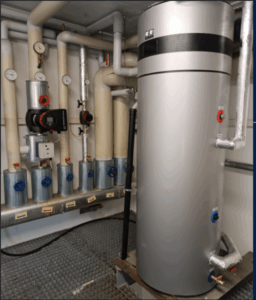Invesis has taken another step forward in delivering sustainable infrastructure. At our A9 motorway project in Thuringia, Germany, which has been operational for 14 years, we’ve implemented a highly impactful measure to cut fossil fuel usage and emissions, aligned with our ESG commitments.
 In July 2025, a modern domestic hot water heat pump was installed at the Operations & Maintenance Center – supported by the Invesis team, led by Felix Ruhrberg and Christian Ostendorf, who oversaw the project from concept to implementation. This system allows the facility to generate hot water using electricity, enabling a complete shutdown of the oil-based heating system during the summer and a partial replacement during the winter months.
In July 2025, a modern domestic hot water heat pump was installed at the Operations & Maintenance Center – supported by the Invesis team, led by Felix Ruhrberg and Christian Ostendorf, who oversaw the project from concept to implementation. This system allows the facility to generate hot water using electricity, enabling a complete shutdown of the oil-based heating system during the summer and a partial replacement during the winter months.
This upgrade is expected to save a minimum of 24,000 litres of heating oil, resulting in a reduction of approximately 66 tonnes of CO₂ emissions over the remaining six years of the project. From a financial perspective, the investment is projected to amortise within four years – even before factoring in the additional benefits of powering the system with on-site solar panels. The installation already proved economically viable from the energy savings between May and September alone.
The PV initiative builds on earlier energy efficiency improvements delivered by our team at another German asset – the A94 Isentalautobahn – where a 170 kWp solar panel system and a 60 kWh battery were installed. This system is expected to generate around 70% of the site’s electricity demand, supporting both core operations and a growing fleet of electric patrol vehicles.
Together, these projects reflect our expanding portfolio of climate-conscious infrastructure solutions across Germany. By embracing energy-efficient technologies and renewable energy systems, we are achieving measurable results in climate protection, operational efficiency, and long-term value creation.
This project is a strong example of how Invesis delivers on its commitment as an investor and developer of sustainable infrastructure.



